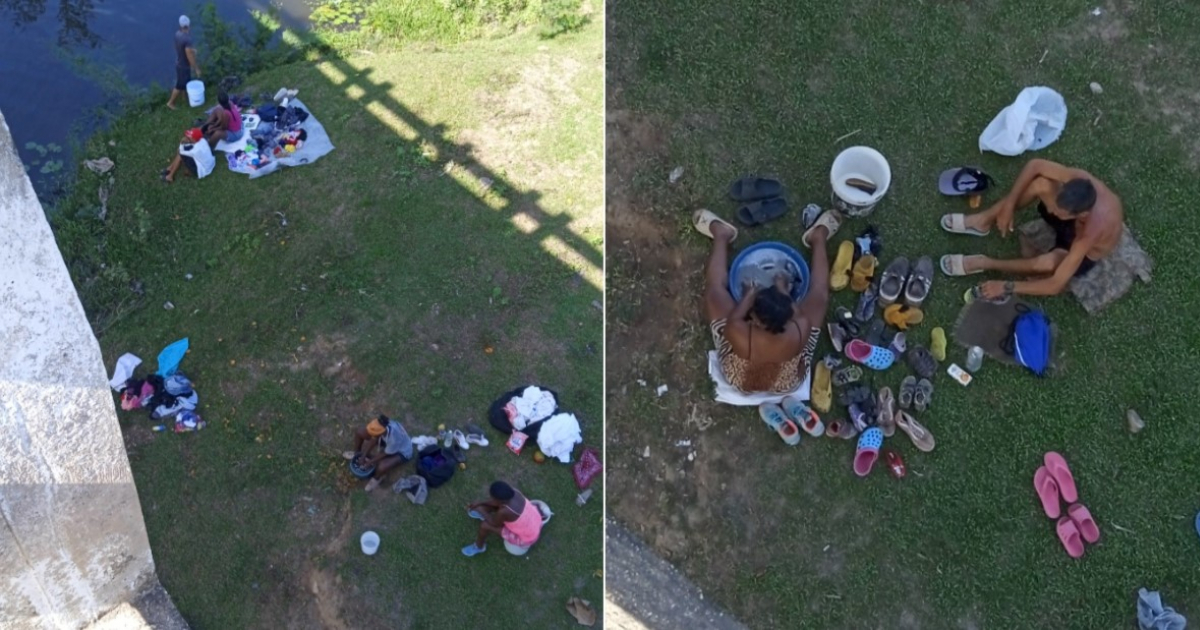The dire shortage of potable water has forced numerous residents in the municipality of San Juan y Martínez, Pinar del Río, to wash their clothes in a local river. This scenario, more reminiscent of a rural area lacking basic infrastructure, has sparked outrage on social media. Users are voicing frustration over going more than 15 days without water in their homes.
"This isn't Haiti or Africa; this is San Juan y Martínez, in Pinar del Río province," declared activist Michael Cala Valladares, who posted images of the situation on Facebook. The pictures show entire families, including women and children, by the river with buckets and soap, all while enduring temperatures exceeding 30 degrees Celsius.
Government Criticized for Inaction
The issue extends beyond the water shortage. Cala, a human rights advocate, also lambasted the local government for its silence and lack of response, accusing it of prioritizing its own interests over the needs of the people. "When a government can't supply water or collect garbage, it only has one option left: step down," he stated.
Residents from the La Astrea neighborhood confirm that the water service has been completely halted. "It's been more than two weeks without a drop of water in our homes. The only options are going to the river or paying for water trucks, which no state salary can cover," reported one resident.
Urban Decay and Health Risks
In addition to the water crisis, urban neglect is rampant. Behind a nine-story building that once had a parking area, mountains of trash now accumulate. "That place has turned into a dump," explained Cala. The responsible institutions have not acted, exacerbating health risks in the area.
Official Promises Fail to Deliver
Earlier this month, the official newspaper Granma acknowledged the complex water supply situation in the province, outlining a 112 million peso investment plan to address it. Authorities claim new pumping equipment has been installed and efforts are being made to eliminate illegal connections. However, these solutions have yet to reach many communities.
In San Juan y Martínez, for example, water distribution cycles—previously every 40 days and now every 20—remain unacceptable for a population that relies on this basic service for a dignified life. Vladimir Matos Moya, vice president of the National Institute of Hydraulic Resources (INRH), stated that the improvement plan is ongoing but acknowledged that "simply reducing delivery frequency isn't enough."
Meanwhile, Engrasio Machín Iglesias, state inspection director of the INRH in Pinar del Río, criticized ongoing irregularities such as illegal water tapping and diversions to agricultural fields, which persist due to penalties "too low to be deterrent."
Reality Contradicts Official Rhetoric
As projects are announced and promises made, the actual situation worsens. Consolación del Sur, the province's second-most populous municipality, faces the gravest water crisis, marked by prolonged supply cycles and frequent motor burnouts. "I don't see any families of leaders in this situation," Cala quipped in his post.
His complaint joins a growing chorus demanding structural change in public service management. "We want a government that addresses the people's needs, not its personal gains," he concluded. Meanwhile, in San Juan y Martínez, washing in the river is no longer an alternative; it's the sole means of survival in a community where water remains elusive and authorities turn a blind eye.
Understanding the Water Crisis in Pinar del Río
Why are residents of San Juan y Martínez washing clothes in the river?
Residents are washing clothes in the river due to a severe shortage of potable water, with homes going more than 15 days without receiving water.
What measures have authorities taken to address the water crisis?
Authorities have installed new pumping equipment and are working to eliminate illegal connections, but these solutions have not yet reached many communities.
What are the criticisms against the local government?
Critics, including activist Michael Cala, accuse the local government of neglecting public needs and prioritizing its own interests, as well as failing to provide basic services like water and waste collection.
